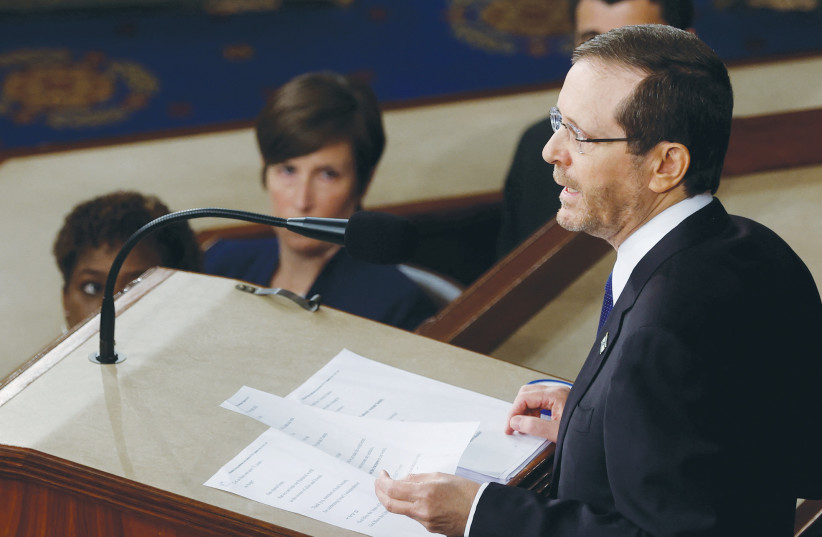Israel’s first president Chaim Weizmann once said, “Miracles sometimes happen, but one has to work terribly hard for them.” Last Wednesday, in his address to both houses of Congress, Israeli President Isaac Herzog accomplished something of a miracle, and he had to work terribly hard to do it.
Israel is navigating uncharted waters as its national debate over the judiciary continues amid unprecedented protests. To make matters more fraught, opinion polls are consistently showing that Israel’s support in the US is weakening as young American Jewry becomes less religious and more progressive.
Yet, when President Herzog walked off the speaker’s rostrum, he had garnered 26 standing ovations and near-universal praise from pundits in America, Israel, and around the world. How he achieved this is worthy of examination by all those who wish to ingratiate the Jewish state with their friends.
How he achieved this is worthy of examination
First, he was gracious. He said thank you – by my count, nearly 20 times in his address. He thanked President Joe Biden for his comprehensive plan to fight antisemitism. He also conveyed his understanding of how important America is to Israel’s past, present, and future. His decision to invite Harry Truman’s grandson and note the relationship between his grandfather and the president came from a place of sincerity and deep respect.

It helps, of course, that this is an Israeli president who spent his formative teenage years in America, where his father served as UN ambassador. He was also chairman of The Jewish Agency for Israel, an organization that, since 1929, facilitates aliyah, ensures the safety of Jewish communities worldwide, works to strengthen Jewish identity and the connection to Israel, and serves as the voice of the Jewish People. There, he spent a significant amount of time visiting cities big and small across the US.
He also found a subtle way to remind Congress and the world that the American-Israeli relationship, like all good relationships, is a reciprocal one. He spoke proudly of Israel standing shoulder to shoulder with America in the face of common challenges and foes. In doing so, his message was clear – what unites us is stronger than what divides us.
He was honest. He spoke about Israel as it is – not some idealized, and easily refuted, notion of a perfect country. He spoke with pride of a “country fighting to defend itself from enemy and foe, yet whose citizens continue to greet each other with the word ‘peace.’”
HE ACKNOWLEDGED his own deep, personal pain at the tumultuous debate in his country, while celebrating the democratic values that allow that debate to take place. He was clear and unmistakable in his belief that both sides of the debate love their country and the responsibility falls on everyone to find a common way forward.
He was also honest about the Israeli-American relationship. He described a new generation of leaders in America and Israel who are less engaged with our countries’ friendship than they should be, and lamented that some take the US-Israel relationship for granted.
He acknowledged that Israel, like any nation, was subject to criticism, something which he respected, especially when it came from friends. But he was clear that “criticism of Israel must not cross the line into negation of the State of Israel’s right to exist,” as doing so crosses the line into antisemitism.
Finally, he gave us hope, and while hope may not be a policy, it has been in short supply lately. He gave us hope that the new generation of leaders in America and Israel would find common ground. He expressed hope that America and Israel would work together to curb the Iranian nuclear threat. And he painted a vision on both sides of the debate over whether the Israeli judiciary would find a path forward together.
Israel, Jewish people have overcome existential threats before
In celebrating Israel’s 75th birthday, President Herzog reminded us that Israel and the Jewish people have overcome existential threats before. He referenced “Hatikvah” as Israel’s national anthem and quoted the late rabbi Lord Jonathan Sacks:
“In Judaism, hope is an active virtue, which requires a great deal of courage. Hope is the belief that together we can make the world better, that we can overcome any setbacks, and heal the fractures in our world.”
I have no doubt that there are cynics and partisans who will dismiss the president’s speech as disconnected from reality or correctly point to his ceremonial role. Yet symbols matter, and so does vision. President Herzog gave us the vision of a strong and growing friendship, with our two democracies facing challenges together.
That vision is possible – we just have to work terribly hard for it.
The writer is head of North America at the Jewish Agency for Israel and the president and CEO of Jewish Agency International Development.
